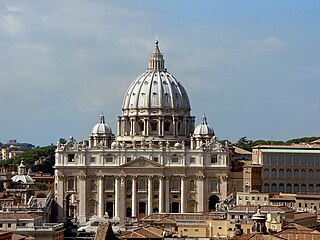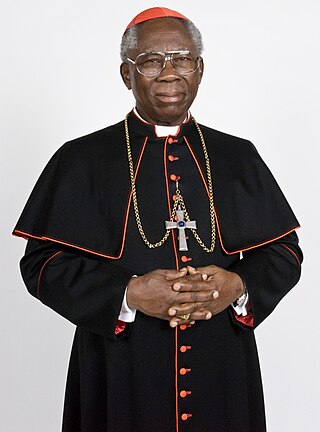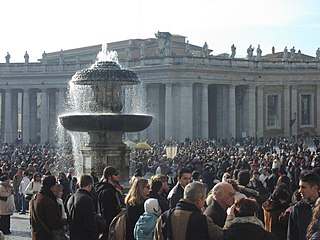
The Second Ecumenical Council of the Vatican, commonly known as the Second Vatican Council or Vatican II, was the 21st and most recent ecumenical council of the Catholic Church. The council met in Saint Peter's Basilica in Vatican City for four periods, each lasting between 8 and 12 weeks, in the autumn of each of the four years 1962 to 1965, although it had been anticipated initially that the work of the Council would have been complete after three sessions.

Apostolicam Actuositatem, also known as the "Decree on the Apostolate of the Laity", is one of the 16 magisterial documents of the Second Vatican Council.
In religious organizations, the laity consists of all members who are not part of the clergy, usually including any non-ordained members of religious orders, e.g. a nun or a lay brother. In both religious and wider secular usage, a layperson is a person who is not qualified in a given profession or does not have specific knowledge of a certain subject. The phrase "layman's terms" is used to refer to plain language that is understandable to the everyday person, as opposed to specialised terminology understood only by a professional.

Francis Arinze is a Nigerian cardinal of the Catholic Church. He was Prefect of the Congregation for Divine Worship and the Discipline of the Sacraments from 2002 to 2008 and before that led the Secretariat for Non-Christians from 1984 to 2002.
The hierarchy of the Catholic Church consists of its bishops, priests, and deacons. In the ecclesiological sense of the term, "hierarchy" strictly means the "holy ordering" of the church, the Body of Christ, so to respect the diversity of gifts and ministries necessary for genuine unity.
Clericalism is the application of the formal, church-based leadership or opinion of ordained clergy in matters of the church or in broader political and sociocultural contexts.
Opus Dei and Catholic Church Leaders discusses the comments and observations of popes, cardinals, and other leaders of the Catholic Church as regards the Personal Prelature of the Holy Cross and Opus Dei.
Lay ecclesial ministry is the term adopted by the United States Conference of Catholic Bishops to identify the relatively new category of pastoral ministers in the Catholic Church who serve the Church but are not ordained. Lay ecclesial ministers are coworkers with the bishop alongside priests and deacons. In other contexts, these may be known as "lay pastoral workers", "pastoral assistants", etc.

The International Alliance of Catholic Knights (IACK) is a non-governmental organization made up of fifteen Roman Catholic fraternal orders from 27 countries on six continents. The IACK was founded in Glasgow on 12 October 1979 at a meeting of the leaders of six fraternal societies, convened on the occasion of the Diamond Jubilee of the Knights of Saint Columba. The organization is headquartered in Hampshire, U.K.
In the Catholic Church, an association of the Christian faithful or simply association of the faithful, sometimes called a public association of the faithful, is a group of baptized persons, clerics or laity or both together, who, according to the 1983 Code of Canon Law, jointly foster a more perfect life or promote public worship or Christian teaching, or who devote themselves to other works of the apostolate.
Brian Farrell LC is an Irish Roman Catholic prelate who served as secretary of the Dicastery for Promoting Christian Unity from 2002 until 2024.
A Catholic lay association, also referred to as Catholic Congress, is an association of lay Catholics aiming to discuss certain political or social issues from a Catholic perspective.
Evangelii nuntiandi is an apostolic exhortation issued on 8 December 1975 by Pope Paul VI on the theme of Catholic evangelization. The title, taken from the opening words of the original Latin text, means "in proclaiming the Gospel". It affirms the role of every Christian, not only ordained ministers, priests, and deacons, or religious, or professional church staff, in spreading the Gospel of Jesus Christ.
This is a glossary of terms used within the Catholic Church. Some terms used in everyday English have a different meaning in the context of the Catholic faith, including brother, confession, confirmation, exemption, faithful, father, ordinary, religious, sister, venerable, and vow.

Catholic laity are the ordinary members of the Catholic Church who are neither clergy nor recipients of Holy Orders or vowed to life in a religious order or congregation. Their mission, according to the Second Vatican Council, is to "sanctify the world".
The role of a Catholic catechist is to catechize the faith of the Catholic Church by both word and example. The Directory for Catechesis states that faith must be "known, celebrated, lived, and turned into prayer" in a personal and total encounter of the heart, mind and senses with Christ. St. John Paul II describes the aim of catechesis as putting "people not only in touch but in communion, in intimacy, with Jesus Christ."
In the Catholic Church, the Synod of Bishops, considered as an advisory body for the pope, is one of the ways in which the bishops render cooperative assistance to him in exercising his office. It is described in the 1983 Code of Canon Law as "a group of bishops who have been chosen from different regions of the world and meet at fixed times to foster closer unity between the Roman Pontiff and bishops, to assist the Roman Pontiff with their counsel in the preservation and growth of faith and morals and in the observance and strengthening of ecclesiastical discipline, and to consider questions pertaining to the activity of the Church in the world."
The Dicastery for the Laity, Family and Life is a dicastery of the Roman Curia. Pope Francis announced its creation on 15 August 2016, effective 1 September 2016. It took over the functions and responsibilities of the Pontifical Council for the Laity and the Pontifical Council for the Family. It has responsibility "for the promotion of the life and apostolate of the lay faithful, for the pastoral care of the family and its mission according to God's plan and for the protection and support of human life."
The Synod of Bishops for the Pan-Amazon region, commonly referred to as the Amazon synod, met in Rome from 6 to 27 October 2019. Pope Francis announced on 15 October 2017 that a special assembly of the Synod of Bishops would work "to identify new paths for the evangelization of God's people in that region", specifically the indigenous peoples who are "often forgotten and without the prospect of a serene future".
Christus vivit is a post-synodal apostolic exhortation of Pope Francis, written in response to the Fifteenth Ordinary General Assembly of the Synod of Bishops, on young people, faith and vocational discernment, held from 3 to 28 October 2018.



